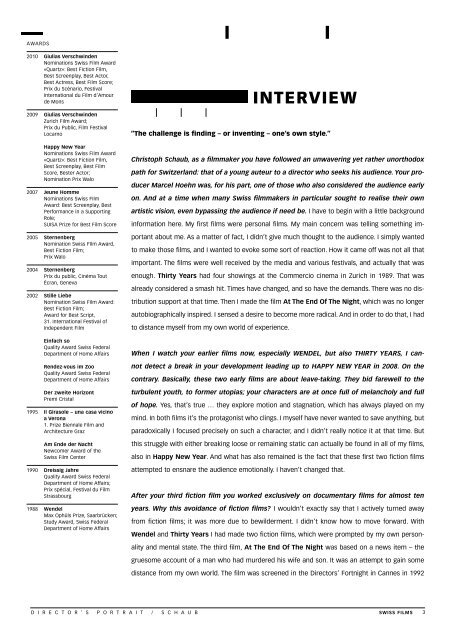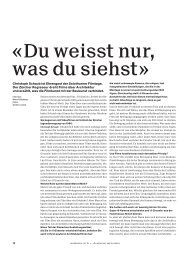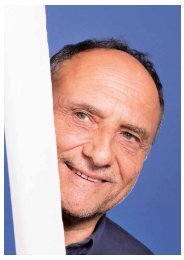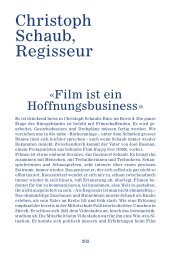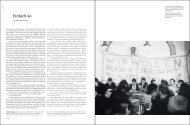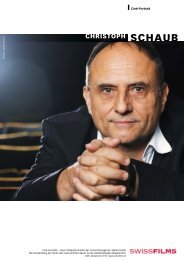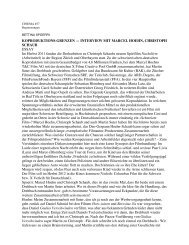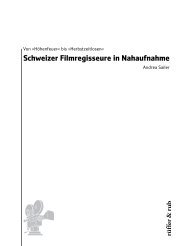Ciné Portrait - Christoph Schaub English
You also want an ePaper? Increase the reach of your titles
YUMPU automatically turns print PDFs into web optimized ePapers that Google loves.
AWARDS<br />
2010 Giulias Verschwinden<br />
Nominations Swiss Film Award<br />
«Quartz»: Best Fiction Film,<br />
Best Screenplay, Best Actor,<br />
Best Actress, Best Film Score;<br />
Prix du Scénario, Festival<br />
International du Film d'Amour<br />
de Mons<br />
2009 Giulias Verschwinden<br />
Zurich Film Award;<br />
Prix du Public, Film Festival<br />
Locarno<br />
Happy New Year<br />
Nominations Swiss Film Award<br />
«Quartz»: Best Fiction Film,<br />
Best Screenplay, Best Film<br />
Score, Bester Actor;<br />
Nomination Prix Walo<br />
2007 Jeune Homme<br />
Nominations Swiss FIlm<br />
Award: Best Screenplay, Best<br />
Performance in a Supporting<br />
Role;<br />
SUISA Prize for Best Film Score<br />
2005 Sternenberg<br />
Nomination Swiss FIlm Award,<br />
Best Fiction Film;<br />
Prix Walo<br />
2004 Sternenberg<br />
Prix du public, <strong>Ciné</strong>ma Tout<br />
Écran, Geneva<br />
2002 Stille Liebe<br />
Nomination Swiss Film Award:<br />
Best Fiction Film;<br />
Award for Best Script,<br />
31. International Festival of<br />
Independent Film<br />
Einfach so<br />
Quality Award Swiss Federal<br />
Department of Home Affairs<br />
Rendez-vous im Zoo<br />
Quality Award Swiss Federal<br />
Department of Home Affairs<br />
Der zweite Horizont<br />
Premi Cristal<br />
1995 Il Girasole – una casa vicino<br />
a Verona<br />
1. Prize Biennale Film and<br />
Architecture Graz<br />
Am Ende der Nacht<br />
Newcomer Award of the<br />
Swiss Film Center<br />
1990 Dreissig Jahre<br />
Quality Award Swiss Federal<br />
Department of Home Affairs;<br />
Prix spécial, Festival du Film<br />
Strassbourg<br />
1988 Wendel<br />
Max Ophüls Prize, Saarbrücken;<br />
Study Award, Swiss Federal<br />
Department of Home Affairs<br />
INTERVIEW<br />
“The challenge is finding – or inventing – one’s own style.”<br />
<strong>Christoph</strong> <strong>Schaub</strong>, as a filmmaker you have followed an unwavering yet rather unorthodox<br />
path for Switzerland: that of a young auteur to a director who seeks his audience. Your producer<br />
Marcel Hoehn was, for his part, one of those who also considered the audience early<br />
on. And at a time when many Swiss filmmakers in particular sought to realise their own<br />
artistic vision, even bypassing the audience if need be. I have to begin with a little background<br />
information here. My first films were personal films. My main concern was telling something important<br />
about me. As a matter of fact, I didn’t give much thought to the audience. I simply wanted<br />
to make those films, and I wanted to evoke some sort of reaction. How it came off was not all that<br />
important. The films were well received by the media and various festivals, and actually that was<br />
enough. Thirty Years had four showings at the Commercio cinema in Zurich in 1989. That was<br />
already considered a smash hit. Times have changed, and so have the demands. There was no distribution<br />
support at that time. Then I made the film At The End Of The Night, which was no longer<br />
autobiographically inspired. I sensed a desire to become more radical. And in order to do that, I had<br />
to distance myself from my own world of experience.<br />
When I watch your earlier films now, especially WENDEL, but also THIRTY YEARS, I cannot<br />
detect a break in your development leading up to HAPPY NEW YEAR in 2008. On the<br />
contrary. Basically, these two early films are about leave-taking. They bid farewell to the<br />
turbulent youth, to former utopias; your characters are at once full of melancholy and full<br />
of hope. Yes, that’s true … they explore motion and stagnation, which has always played on my<br />
mind. In both films it’s the protagonist who clings. I myself have never wanted to save anything, but<br />
paradoxically I focused precisely on such a character, and I didn’t really notice it at that time. But<br />
this struggle with either breaking loose or remaining static can actually be found in all of my films,<br />
also in Happy New Year. And what has also remained is the fact that these first two fiction films<br />
attempted to ensnare the audience emotionally. I haven’t changed that.<br />
After your third fiction film you worked exclusively on documentary films for almost ten<br />
years. Why this avoidance of fiction films? I wouldn’t exactly say that I actively turned away<br />
from fiction films; it was more due to bewilderment. I didn’t know how to move forward. With<br />
Wendel and Thirty Years I had made two fiction films, which were prompted by my own personality<br />
and mental state. The third film, At The End Of The Night was based on a news item – the<br />
gruesome account of a man who had murdered his wife and son. It was an attempt to gain some<br />
distance from my own world. The film was screened in the Directors’ Fortnight in Cannes in 1992<br />
D I R E C T O R ' S P O R T R A I T / S C H A U B SWISS FILMS 3


